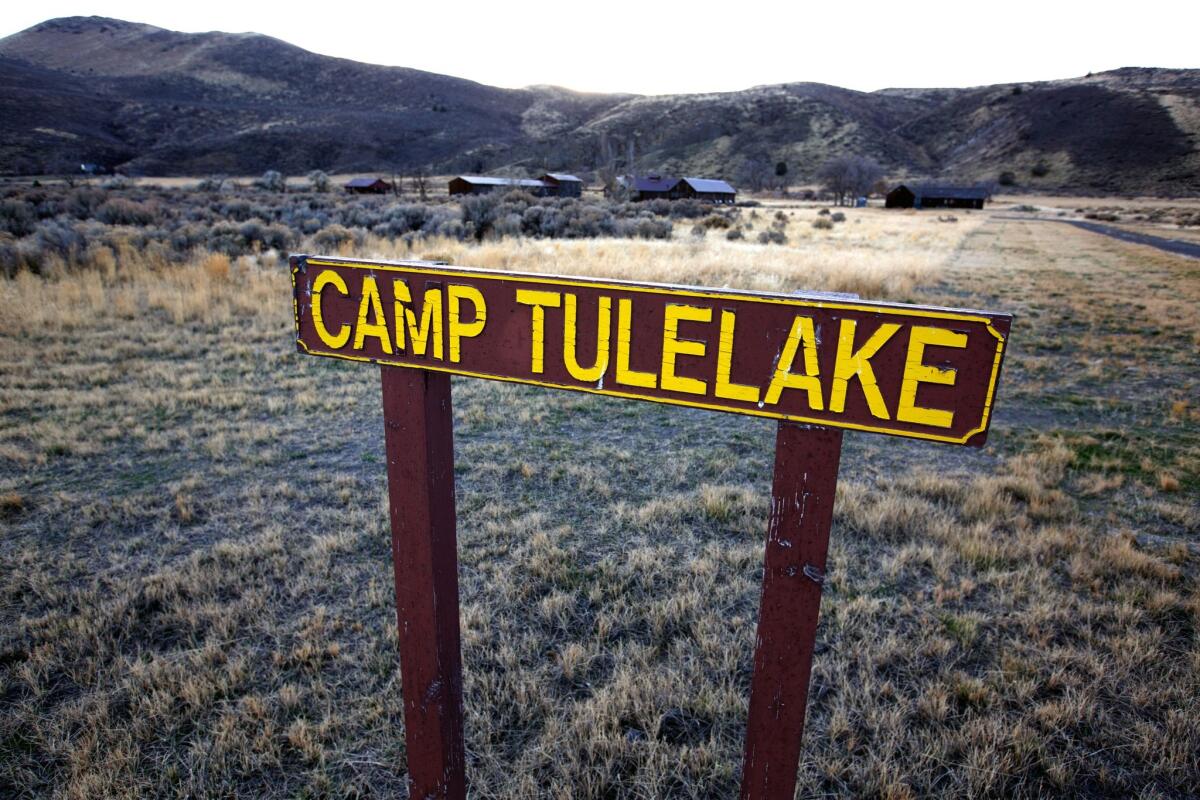Letters about Japanese internment weren’t ‘civil, fact-based discourse’

Many Times readers have taken issue with two letters in this week’s Travel section, which criticized a Nov. 27 article about National Park sites that address issues of race and ethnicity in America’s history.
The letters employed cultural stereotypes to suggest that the mass internment of Japanese Americans during World War II was justified, and sought to minimize the hardships they endured.
Davan Maharaj, editor-in-chief and publisher of The Times, said the letters did not meet the newspaper’s standards for “civil, fact-based discourse” and should not have been published.
The Nov. 27 article highlighted the Tule Lake and Manzanar relocation camps in California, where thousands of Japanese Americans were detained. Tule Lake was especially notorious, the only one of the 10 war relocation camps with a stockade and jail. Japanese Americans deemed disloyal were sent there.
The article quoted park ranger Angela Sutton, who has worked at Tule Lake since the park was established in 2008, on why it’s important to remember what happened:
“We take a dark spot in our own history, something other countries might want to cover up,” she said, “and we maintain it and preserve it so that future generations can learn.”
The facts surrounding the internment are well-established. In all, 120,000 Japanese Americans were detained during World War II. The majority were U.S. citizens. In 1988, President Reagan signed the Civil Liberties Act, in which the U.S. government formally apologized to the internees and established a $1.25-billion trust fund to pay reparations.
The law said the mass internment resulted from “race prejudice, war hysteria and a failure of political leadership” rather than from legitimate security considerations.
The two letters published in the Dec. 11 Travel section accused the National Parks article of engaging in an “anti-U.S. remake of history” and of needing balance. The letters included racial stereotypes:
“Japanese have an extremely strong attachment to family, and even more so back then. First- generation and, to a lesser extent, Japanese here would have been expected to follow the wishes of their elders in Japan.”
And they suggested that it wasn’t so bad in the camps:
“Virtually everyone in the U.S. was assigned jobs to help the war effort. The Japanese were assigned the job of staying out of the way and not causing complications. Millions of Americans were assigned far worse jobs.”
Or that the detainees could have had it worse elsewhere:
“War is evil, but I would have much rather been interned by the U.S. in California than by the Japanese in their captured lands.”
Outraged readers found the opinions offensive and insensitive.
“Framing the forced internment of Japanese Americans as their ‘contribution to the war effort’ is, frankly, disgusting,” wrote Matthieu Boblet of Bothell, Wash. “Many lost their homes, livelihoods, ways of life and childhoods as they spent years locked away, forced to live in rickety shacks out in the desert due to knee-jerk reactionary xenophobia. Framing it as anything different is a disgrace and outright falsehood.”
Framing the forced internment of Japanese Americans as their ‘contribution to the war effort’ is, frankly, disgusting.
— Matthieu Boblet, Bothell, Wash.
Joanne Oppenheim of New York wrote: “To say the ‘interned Japanese were housed, fed, protected and cared for’ is an all too familiar whitewash for what really happened as immigrant and citizens were forced to leave their homes, jobs, schools and communities. Families of six were housed in horse stables that still stank of their former tenants and a few months later shipped to God-forsaken camps where families lived in single-room barracks with inadequate heat, terrible food and poor health facilities. To say that they were there to be protected and cared for is an outright lie!”
Karin Wang of Los Angeles said she was disappointed in The Times for publishing the letters. “The internment is widely acknowledged and accepted as a major civil liberties violation and resulted in no prosecutions for espionage; to print a letter saying that Japanese Americans should be grateful that the government incarcerated 120,000 of them without due process is normalizing the ‘alt-right’ and white supremacy.”
The Times’ Travel editor, Catharine Hamm, said she approved publication of the letters thinking that the writers’ views, although provocative, would be balanced by subsequent letters of response.
Hamm said that, in retrospect, that was not the right decision, because the views expressed in the letters did not lend themselves to reasoned discussion.
Maharaj made the same point in discussions with staff members disturbed by the letters, and in remarks to editors during The Times’ daily news meeting this morning.
“Letters in The Times are the opinions of the writers, and editors strive to include a range of voices. But the goal is to present readers with civil, intelligent, fact-based opinions that enlarge their understanding of the world,” Maharaj said. “These letters did not meet that standard.”
The Travel section plans to print letters of response in the Dec. 18 edition.
readers.representative@latimes.com
For staff and newsroom news, follow @LATreadersrep on Twitter.







